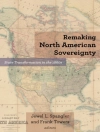When Ronald Reagan was elected in 1980, limits on NASA funding and the lack of direction under the Nixon and Carter administrations had left the U.S. space program at a crossroads. In contrast to his predecessors, Reagan saw outer space as humanity’s final frontier and as an opportunity for global leadership. His optimism and belief in American exceptionalism guided a decade of U.S. activities in space, including bringing the space shuttle into operation, dealing with the 1986
Challenger accident and its aftermath, committing to a permanently crewed space station, encouraging private sector space efforts, and fostering international space partnerships with both U.S. allies and with the Soviet Union. Drawing from a trove of declassified primary source materials and oral history interviews, John M. Logsdon provides the first comprehensive account of Reagan’s civilian and commercial space policies during his eight years in the White House. Even as a fiscal conservative who was hesitant to increase NASA’s budget, Reagan’s enthusiasm for the space program made him perhaps the most pro-space president in American history.
Table des matières
1. A Cowboy Comes to Washington.- 2. Getting Started.- 3. First Decisions.- 4. An Initial Reagan Space Policy.- 5. SIG (Space) Gets Started.- 6. Space Shuttle Issues: Round One.- 7. The Next Logical Step.- 8. Debates and Disagreement.- 9. The Space Station Decision.- 10. ‘Follow Our Dreams to Distant Stars’.- 11. Together in Orbit: Round One.- 12. Space Commercialization.- 13. Commercializing Earth Orbit.- 14. Space Shuttle Issues: Round Two.- 15. Finishing the First Term.- 16. Changing of the Guard.- 17. Shuttle Wars.- 18.
Challenger.- 19. Recovering from the Accident.- 20. Correcting a Policy Mistake.- 21. The Home Stretch.- 22. Together in Orbit: Round Two.- 23. The Quest for Leadership.- 24. The Reagan Space Legacy.
A propos de l’auteur
John M. Logsdon is a world-renowned historian and analyst of space issues. He is the author of
John F. Kennedy and the Race to the Moon (Palgrave, 2010) and
After Apollo? Richard Nixon and the American Space Program (Palgrave, 2015), both of which are award-winning, definitive accounts of presidential space policy. He is Professor Emeritus at The George Washington University’s Elliott School of International Affairs and founder of its Space Policy Institute.












